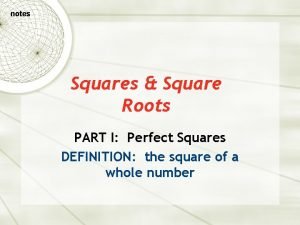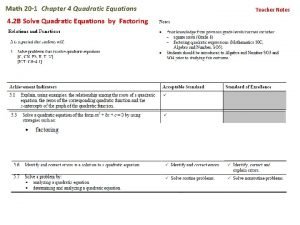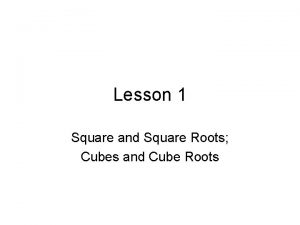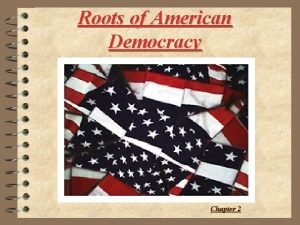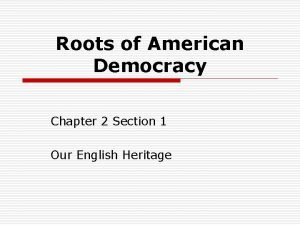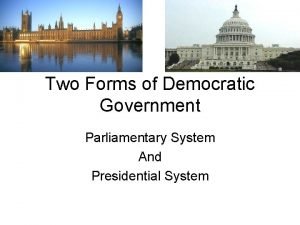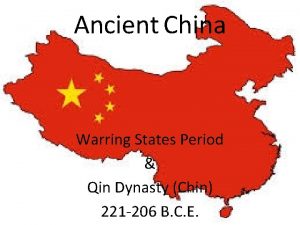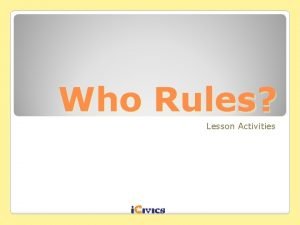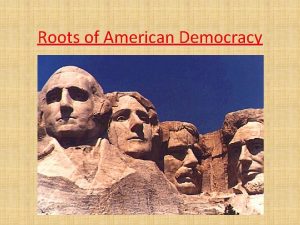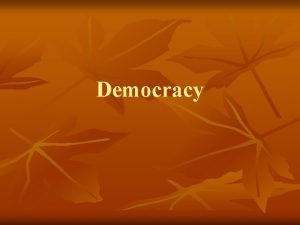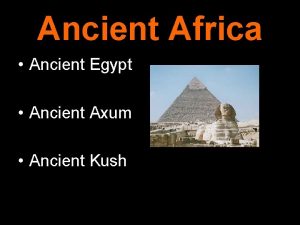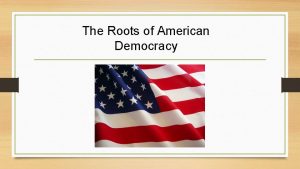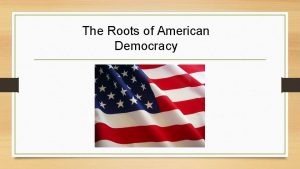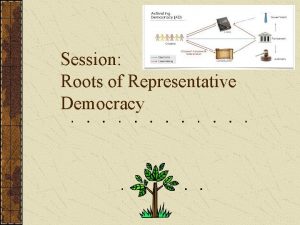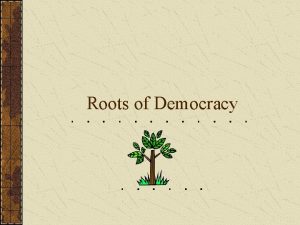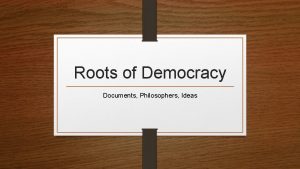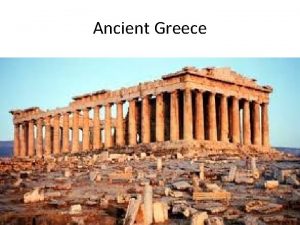Ancient ROOTS of DEMOCRACY CAN PEOPLE DECIDE DEMOCRACY














- Slides: 14

Ancient ROOTS of DEMOCRACY

CAN PEOPLE DECIDE? DEMOCRACY = People. Rule originated in ANCIENT GREECE (in Athens) & ANCIENT ROME


The idea that each person could be a decision-maker implied that each person was treated with dignity and respect. Ancient Greeks admired human beings, individual achievements & believed that every person has dignity &worth. This is reflected in Greek art, as well as the Ancient Greek idea of democracy.

In the 5 th century BC, Ancient Athens invented a new form of government, in which people ruled – called DEMOCRACY (in Greek - rule by the people). Greek democracy was direct democracy. • direct democracy is when everyone participated in the government personally & directly

Was Ancient Greek democracy perfect? Could everyone actually participate & vote? • Actually, no. Some people were excluded from this first democracy in human history. Who were they? • Women, slaves and foreign residents couldn’t vote.

REASON, LAW & EDUCATION • Ancient Greek philosophy focused on the role of reason, logical thinking, laws, knowledge, education. • The Ancient Greek philosophers SOCRATES, PLATO & ARISTOTLE laid the foundations of Western philosophy. • SOCRATES (Socratic method) focused on logic and reason – using a Q & A approach. Why is that important for democracy?

• Aristotle wrote: “Passion influences those in power, even the best of men, but law is REASON without desire. ” • Aristotle also wrote against tyranny (autocracy, rule by one person) “A tyrant has no regard to any public interest, except as conducive to his private ends… A tyrant is not to be overthrown until men begin to have confidence in one another. ”

• What was Plato’s big idea? • Plato wanted society governed by the wisest rulers, whom he called “philosopher-kings. ” • In his writings, Plato created a Utopia – a perfect state ruled by a wise and educated ruler. • How do these ideas apply to democracy?

Checks & balances between the 3 branches in the USA • Ancient Greeks were also the first ones to develop Three Branches of Government - and they are… • Legislative • Executive • Judicial • Why was that important for a true democracy? • To prevent one branch from taking over.

DEMOCRACY in ANCIENT ROME

Ancient Roman contributions to Democracy • Ancient Rome invented indirect democracy = Republic = Representative Democracy • Why is this important? • In most countries, it’s not practical to have a direct democracy (too many people).

The 12 TABLES (Tablets) • Ancient Romans understood the importance of having WRITTEN Laws. They had the laws carved on 12 stone tablets and publicly displayed. Why does it matter? • This established the idea that the laws apply equally to every citizen and can’t be changed on a whim.

Principles of Roman Legal Code: • Ancient Romans had a well organized system of WRITTEN LAWS (LEGAL CODE) similar to ours: fairness, equality treatment under the law, innocent until proven guilty. • Importance for democracy? • Set the foundations for fairness, equality & protecting people’s rights in the legal system.
 Chonp
Chonp Perfect squares 1-10000
Perfect squares 1-10000 Existence and uniqueness of square roots and cube roots
Existence and uniqueness of square roots and cube roots The roots of american imperialism 1. economic roots
The roots of american imperialism 1. economic roots Product of roots of quadratic equation
Product of roots of quadratic equation Perfect cube list
Perfect cube list Chapter 2 roots of american democracy answers
Chapter 2 roots of american democracy answers Chapter 2 roots of american democracy answers
Chapter 2 roots of american democracy answers Presidential republic
Presidential republic Ancient communication devices
Ancient communication devices Ancient india vs ancient china
Ancient india vs ancient china People power democracy
People power democracy Ancient china people
Ancient china people King aeetes golden fleece
King aeetes golden fleece Theocracy
Theocracy

